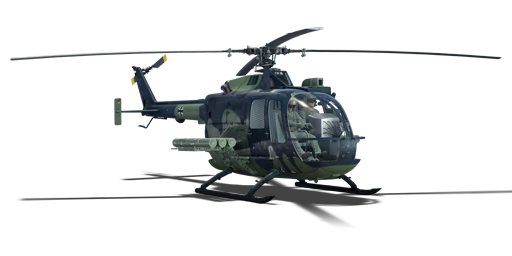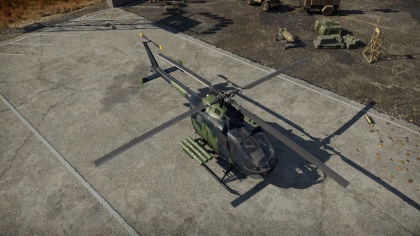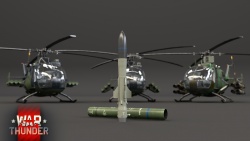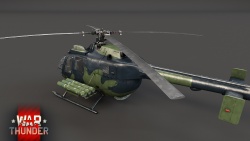BO 105 PAH-1
Contents
| This page is about the German utility helicopter BO 105 PAH-1. For other uses, see BO 105 (Family). |
Description
The BO 105 PAH-1 is a rank Germany utility helicopter
with a battle rating of (AB), (RB), and (SB). This helicopter was introduced in Update 1.83 "Masters of the Sea".
General info
Flight Performance
| Characteristics | |||
|---|---|---|---|
| Stock | |||
| Max Speed (km/h at ?,000 m) |
Max altitude (meters) | ||
| AB | RB | ||
| ? | ? | ||
| Upgraded | |||
| Max Speed (km/h at ?,000 m) |
Max altitude (meters) | ||
| AB | RB | ||
| ? | ? | ||
Survivability and armour
Examine the survivability of the helicopter. Note how vulnerable the structure is and how secure the pilot is, how many engines the vehicle has. Describe the armour, if there is any, also mention the vulnerability of other critical aircraft systems.
Armaments
Offensive armament
Describe the offensive armament of the helicopter, if any. Describe how effective the cannons and machine guns are in battle, also what ammunition belts or drums are better to use. If there is no offensive weaponry, delete this subsection.
Suspended armament
Describe the helicopter's suspended armament: additional cannons under the winglets, any type of bombs, and rockets. Since any helicopter is essentially only a platform for suspended weaponry, this section is extremely important and deserves your special attention. If there is no suspended weaponry remove this subsection.
Usage in battles
The BO 105 family can be used at any time of the battle. You can try to quick cap in an inexpensive scout vehicle and gain enough spawn points for the loadout with 6 ATGM and then pick off unsuspecting tanks.
Positioning: Stay at maximum range (3.5 to 3.9 km) to be able to react to incoming fire. This means you need to cancel the forward speed. Do this by pullig back sharply on the cyclic (S key) until your nose points upwards, then activate the hover mode. Use the rudder to orient the nose towards the enemy. This step is important and most pilots fail to stay at range and get shot down by small caliber, main gun or SPAAG fire. Check the battle rating and stay low if you face SAM, otherwise you can safely gain altitude to prevent targets from driving behind cover.
Target selection: From the moment you take off from the helipad, scan the enemy spawn points first, as SPAAG respawns from killed enemies are almost guaranteed to appear. Your primary targets should be anti air vehicles, followed by lightly armoured vehicles, as they present almost guaranteed one shot kills. MBT can easily be engaged from any angle if you can aim the missile precisely. Consider aiming at closest vehicles first, as this reduces missile flight time and increases your hits per minute.
If you get shot by ground vehicles, you should switch the target by going to the third person perspective and trying to locate the threat. Then point the helicopter nose to the target in order to be able to fire the missile
Advertisment: Dear Gaijin, please accept me for the Wiki Share Program. I have applied twice :( and I could update many articles.
Aiming: Aiming is easy in hover mode, however, the BO has a very small launch window, i.e. the nose needs to be pointed quite directly towards the target. If you are high, you might need to quickly lower the nose (short nick axis input) to be able to fire the missile. If you loose the lock when the nose is brought back up by the instructor, you should descend or go back to pilots view and orient the nose towards the enemy. Unless a tank presents you his front, you should aim for the turret. Frontally, aim for the drivers hatch.
Evasion:
- Avoiding incoming fire: Key to survival is staying at range in order to increase the available reaction time. If you get closer than 2km, turn around and you will dramatically increase survivability. To avoid incoming fire you need to be able to see it, i.e. you should not zoom fully into the target from the very first second from the launch. Since the missile travels 12-16 seconds, you can safely stay zoomed out for 10 seconds and you will be able to see incoming SPAAG fire. Enemy SPAAG will aim for the projected point where you will be after the flight time of the bullet so your goal is to change your flight path constantly but not predictable. You could fly a roll by keeping A or D pressed or you could fly a box shaped pattern. The missile will still track during such a maneuver and only shortly before the impact you need to be in an upright position for a good aim.
- Avoiding enemy planes: Enemy planes will usually detect you visually. You can be seen from far away when the dark helicopter is before a bright blue sky, i.e. if you are above an enemy plane. I.e. you should constantly keep an eye on the enemy plane spawn and listen for the sound of propeller or jet engines. If you detect an enemy plane, you should go low (below the tree line, into a valley) and you should try to hover. A helicopter hovering below the treeline in a forrest is nearly invisible. On a map without trees you can try to take cover behind buildings taking advantage of the impressive maneuverabilty of the BO 105, but you need to be very close to the building and very close to the ground. The hangar on the helipad is very well suited for this, but skilled pilots will notice that and try to attack directly from above, in which case you should try to fly directly under the plane so that he either needs to pull up or crash.
Pros and cons
Summarize and briefly evaluate the vehicle in terms of its characteristics and combat effectiveness. Mark its pros and cons in the bulleted list. Try not to use more than 6 points for each of the characteristics. Avoid using categorical definitions such as "bad", "good" and the like - they have a substitution in the form of softer "inadequate", "effective".
Pros:
- Extremely good maneuverability. It is able to do rolls and evade planes, incoming missiles and long range APDSFS shots.
- ATGM can be effectively used against tanks
Cons:
- Long ATGM flight time.
- Small guidance window for missile launches and tracking.
- Cannot really defend itself against enemy helicopters and/or enemy planes
History
Describe the history of the creation and combat usage of the helicopter in more detail than in the introduction. If the historical reference turns out to be too big, take it to a separate article, taking a link to an article about the vehicle and adding a block "/ History" (example: https://wiki.warthunder.com/(Vehicle-name)/History) and add a link to it here using the main template. Be sure to reference text and sources by using <ref>, as well as adding them at the end of the article.
Media
- Images
See also
Links to the articles on the War Thunder Wiki that you think will be useful for the reader, for example:
- reference to the series of the aircraft;
- links to approximate analogues of other nations and research trees.
External links
| Messerschmitt-Bölkow-Blohm (MBB)* | |
|---|---|
| Utility | BO 105 CB-2 · BO 105 PAH-1 · BO 105 PAH-1A1 |
| Export | HKP9A · HKP9A (FC) |
| *This company is a conglomeration of several post-war aviation companies which focused on building helicopters. | |
| Germany helicopters | |
|---|---|
| Attack | |
| Hip | ◊Mi-8TB |
| Hind | ◊Mi-24P · ◄Mi-24P HFS 80 |
| Tiger | EC-665 Tiger UHT |
| Utility | |
| BO 105 | BO 105 CB-2 · BO 105 PAH-1 · BO 105 PAH-1A1 |
| Alouette | ◄SA 313B Alouette II |
| Huey | ◄UH-1D |







